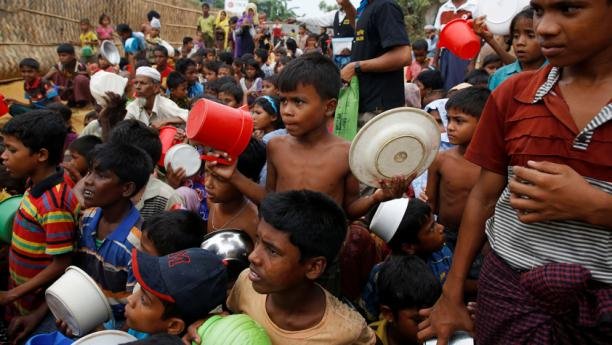Thousands of children saw horror unfolding in their homes in Myanmar and they fled to safety in Bangladesh after walking through jungles and hills for days.
However, around 40,000 of the little souls lost contact with either or both of their parents, according to a survey by the social welfare ministry.
Of the children, 8,882 have lost track of both of their parents. They are now staying with their relatives, said Md Ali Noor, additional secretary of the ministry, quoting findings of the two-month survey carried out on the Rohingya slums in Cox’s Bazar from September 23 last year.
All these Rohingya children do not know what exactly happened to their parents. Many of them fear their parents are dead.
As many as 655,000 Rohingyas have taken shelter in Bangladesh since violence erupted in Rakhine State in August last year.
According to estimates, the refugees include around three lakh children. Save the Children says another 48,000 are likely to be born in the squalid camps in Teknaf and Ukhia this year.
Children living in those camps are vulnerable to various diseases as a large number of them suffer from malnutrition. Aid workers have expressed concerns over their safety as well as a lack of educational facilities available for them.
In such a situation, the social welfare ministry in collaboration with the Unicef has taken up a project to provide the children with educational and psychosocial support.
The Tk 17.22 crore project aims at giving financial support to around 9,000 “orphan” children. As many as 100 child-friendly spaces, 90 adolescent clubs and 90 child protection committees will also be formed to supervise around 34,000 children.
“We are now further cross-checking the survey results,” Ali said, adding that the verification process would start on January 27.
“The child-friendly spaces and the clubs will remain open every day from 9:00am to 5:00pm and the children will get all sorts of support from there,” Jamila Akhter, child protection specialist of Unicef, told The Daily Star.
Two volunteers would be recruited from the Rohingya community for each of the child-friendly spaces. A total of 50 social workers would be recruited to monitor the clubs and the committees, he said.
Under the project, each of the 9,000 orphans would be given Tk 2,000 in cash every month.
“We will identify the children who need the cash most and would give them the amount for the next six months,” she said.
Apart from the financial aid, the 90 child protection committees would provide recreational support to Rohingya children aged 14 and above.
“The centres will educate the children about various issues, including reproductive health. Those will also raise awareness among the children about child trafficking,” said additional secretary Ali Noor.
“The project was taken up to protect all children from violence. We know that the children are already traumatised,” said Jamila adding that “The project might be extended if the repatriation of the Rohingyas takes time.”
Smartcards would also be given to the Rohingya “orphans,” she added.
The Ministry of Social Welfare had asked the deputy commissioner in Cox’s Bazar to allocate 200 acres of land in Balukhali for building shelters for those children. The initiative, however, did not progress.
Contacted, Cox’s Bazar DC Md Ali Hossain said, “The ministry has already identified the orphan children. They are all living with their close relatives.
“There was a proposal to keep them separated and relocate them to a designated place. But as far as my knowledge goes, there was no progress in the work.”
Bangladesh had seen influx of Rohingyas from Myanmar also in 1978, 1991 and 2016. Now, more than one million Rohingyas are staying in the country.
Myanmar’s treatment of its Muslim Rohingya minority appears to be a “textbook example” of ethnic cleansing, says the United Nations human rights body UNHRC.
*News Searching By Thedailystar*























